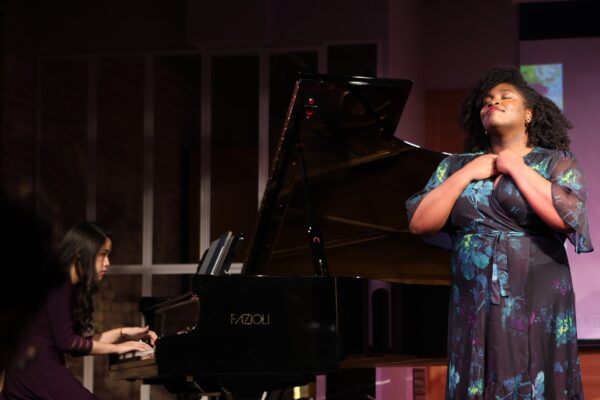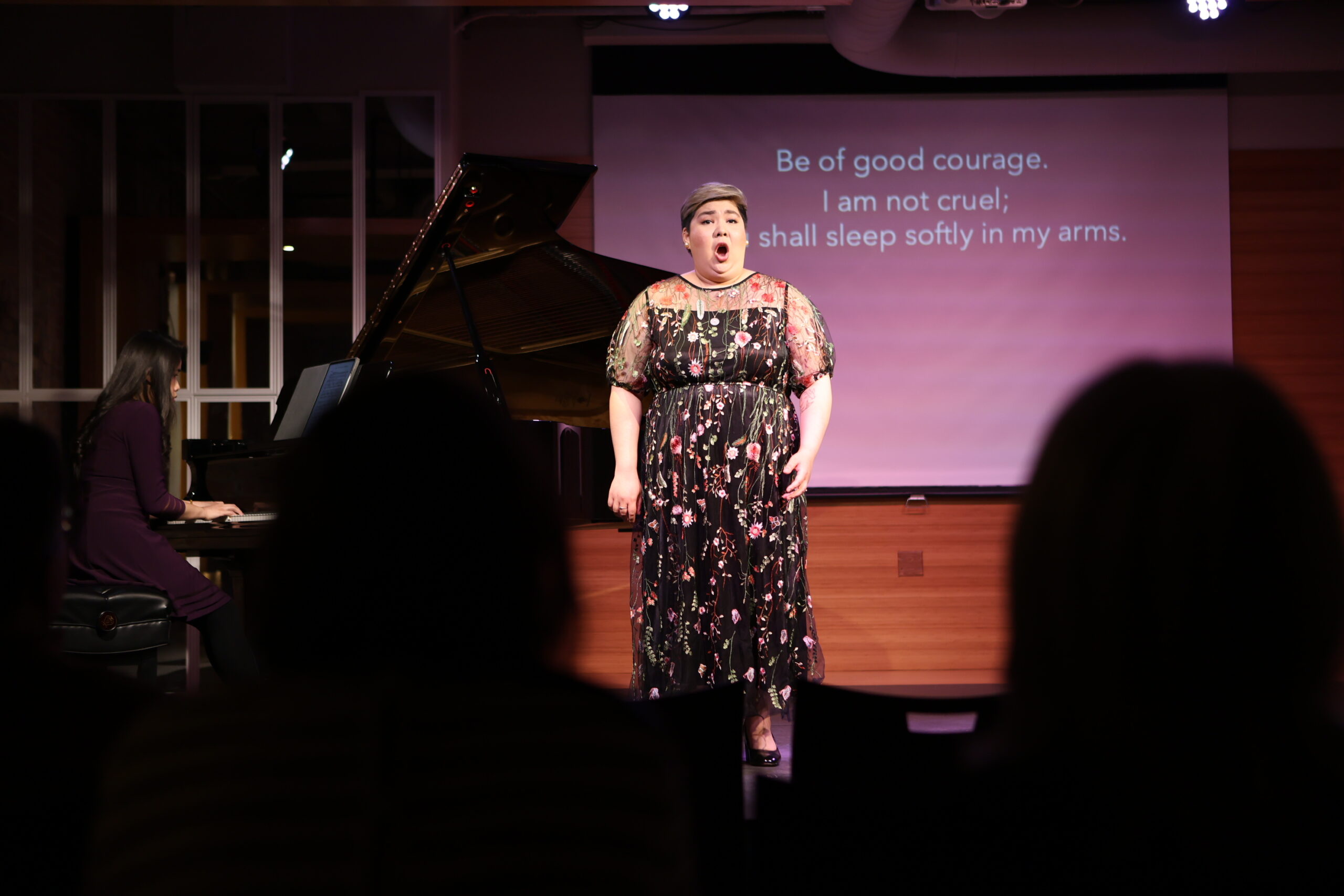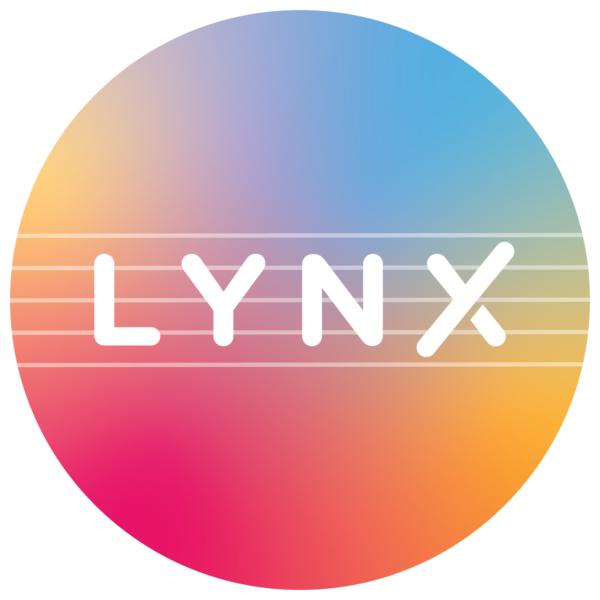The Project…
“Accessible Poetry Courses for and by non-speaking Individuals“
Location: Chicago
A 6-week virtual poetry-writing course co-taught by DJ Savarese and Ralph Savarese that is open to and welcoming of the nonspeaking autistic community as well as disabled and nondisabled participants. Following the course, students will have the opportunity to share their poetry via a public-facing poetry reading. LYNX celebrates the creation of inclusive and accommodating performance and educational spaces where different communities can interact and enhance mutual respect for one another.
The Organization…
Founded in 2015, LYNX amplifies diverse voices and connects communities through new song commissions, inclusive concerts, and innovative educational programming.
Follow LYNX Project: Website | Facebook | Instagram
*Featured Image: In this December 12, 2022 Facebook post, The LYNX Team was asked to share in one word what LYNX means to them.
The Q&A…
Interview with Florence Mak, pianist, Artistic Director and Founding Member, and Michelle Ravitsky, soprano and Interim Executive Director
Q: How do you see the arts/culture/humanities as being essential?

Michelle Ravitsky: During the pandemic, we as a society realized how much we value connection, collaboration, and communication with others. It was only when this opportunity to connect was taken away from us that we recognized how much we needed this connection. In our corner of the arts world, we place a lot of value in community, collaboration, and connection. LYNX Project is an art song organization and art song is traditionally a collaboration between solo voice and piano. Collaboration is the essence of how we perform this music because we can’t do it alone. Not only do we have two performers, but we also have the text from the poet and the music written by the composer. That is what is so special and valuable about this art form.
Florence Mak: To add to that, the world has been experiencing a lot of change, not just as a result of the pandemic, but through war and politics. There’s a huge divide, and when tragedy strikes and something massive happens, we often see the arts to be the first to respond in bringing communities together by creating concerts, holding space, and having these moments where we can have this shared experience of what is happening.
Q: What is the most important thing people should know about your work?
Florence Mak: Our work centers around inclusivity. With our concerts, they look and feel a little different. We welcome our audience as they are and try to create a relaxed performance atmosphere; movement, fidgets, and stims are welcome in our space. When possible, we have a sensory-relief space outside the concert hall. In addition, we use handwaving (ASL applause) and finger-snapping in lieu of clapping.
Michelle Ravitsky: Going off of Florence’s point, we believe that everyone deserves a seat at the table. For our concert spaces, we say “Come as you are, you are welcome here.” And in the context of our educational programming side, everyone’s opinion and voice matters when collaboration comes into play.
Q: How did you arrive at doing what you do?

Florence Mak: LYNX was founded in 2015 by Megan Moore and Caitleen Kahn. They invited Steven Humes and me to be part of the journey to bring art song back to the community. Unlike opera, which has the glitz and glam of theater sets, costumes, and an orchestra, art song is a much more intimate genre; all you need is a singer and a pianist. In 2017, we launched the Amplify Series, which commissions composers to set the words of autistic poets, who are primarily nonspeaking, to music. The inspiration came from then 16-year-old Ryan Harris, a young man with autism who is primarily nonspeaking, whom we met through Megan and LYNX board alumni Katie Masotti and her work with the Cincinnati Rapid Prompting Method (RPM) community. Ryan was asked, “What is your greatest dream?” and he letterboarded, “I want to see the world not by the whole, but by the all too beautiful small things.” His words became the impetus for creating the commissioning series. Throughout the years, members of the autistic nonspeaking community have guided LYNX in shaping this project which led to the creation of the Amplify Advisory Council, all of whom have collaborated as poets and writers for the Amplify Series. They have also created a presentation on Neurodiversity and Presuming Competence. We just celebrated our fifth season of the Amplify Series, and we’re so honored to provide a global platform for these voices to reverberate with our joint release of sheet music (Amplify Anthology) and album (beautiful small things).
Michelle Ravitsky: I joined the team a year and a half ago as the Program Coordinator and I’ve just recently taken on the role of interim Executive Director. LYNX has been planting such beautiful roots in the Chicago area and it is an honor and privilege to continue that trajectory in a leadership position. The future is so bright and we’re excited to continue #BuildingLYNX!
Q: Who makes your work possible?
Michelle Ravitsky: I think it goes back to the idea of collaboration. All the folks we work with – starting with
the poets we commission, the composers we commission, and the performing artists we collaborate with. Our small but mighty staff, our board, our funders, and our supporters. The circle starts small and then grows bigger and bigger. We couldn’t do the things we do without all of these people. Collaboration and community are ingrained in all the things that we do. We’d be nothing without our incredibly supportive community.
Florence Mak: To add to Michelle’s comment, it really takes a village. The families of the writers, our supporters, and our donors all contribute to making what we do possible. Community links help build LYNX.
Q: Anything else you’d like to add?
Florence Mak: The people that I have met through LYNX have truly left an imprint on my heart. I am constantly inspired by the relationships and collaborations that we have built with the poets, composers, and performers. At our very first Amplify concert, being able to share the space with the autism community was incredibly powerful and moving. There was so much love for the music and for one another. That experience changed me as a person, and I am very grateful to be part of this family.
Michelle Ravitsky: We all know the famous line: “If your work is doing something you love, then it won’t feel like work.” That is absolutely the case here. It is so meaningful to be able to amplify these voices that are so thoughtful and powerful yet communicate with the world in a different way. I am deeply moved by the art that is created in our spaces and excited to share our work more broadly. It is truly a privilege to do what we do.
Suggested Viewings:
- SPELLERS is a full-length documentary that tells the stories of eight nonspeakers, who all found their voice through the process of using a letterboard to communicate their thoughts and feelings.
- A presentation on Neurodiversity and Presumed Competence
About The Illinois Humanities Grantee Partner Spotlight
Illinois Humanities highlights the work of our Community Grants program partners through our “Grantee Spotlight.” It shines the light on our grantee partner’s work, offering details about the organization and the funded project, as well as a Q&A with a team member at the organization. More: ILHumanities.org/Spotlight
About Illinois Humanities
Illinois Humanities, the Illinois affiliate of the National Endowment for the Humanities, is a statewide nonprofit organization that activates the humanities through free public programs, grants, and educational opportunities that foster reflection, spark conversation, build community and strengthen civic engagement. We provide free, high-quality humanities experiences throughout Illinois, particularly for communities of color, individuals living on low incomes, counties and towns in rural areas, small arts and cultural organizations, and communities highly impacted by mass incarceration. Founded in 1974, Illinois Humanities is supported by state, federal, and private funds.
Learn more at ilhumanities.org and on Facebook, Twitter, Instagram, and LinkedIn @ILHumanities.
